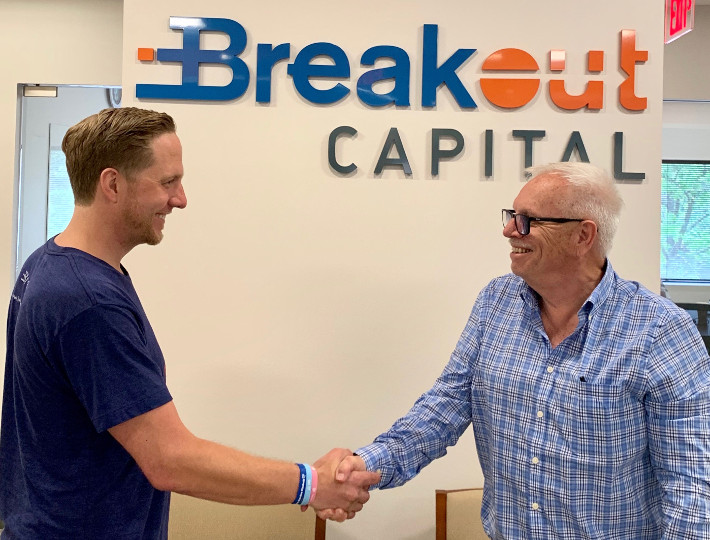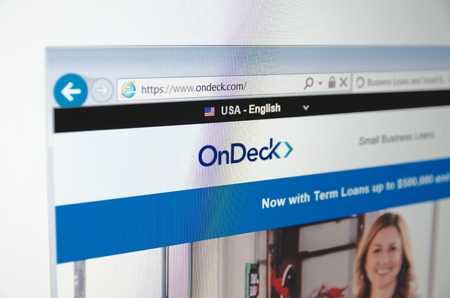Business Lending
Become: The Who, What, and Why of a Rebrand
July 23, 2019Last week Lending Express rebranded to Become. Founded in 2016, the company, which educates businesses looking for loans on how to appear more attractive to funders, was spearheaded by CEO Eden Amirav in Australia originally, with an eventual expansion to the US. Three years in, the company has over 50 lending partners across its two markets, a record of having facilitated over $150 million in funding, and more than 150,000 members on their platforms. As indicators of progress go, these are far from undesirable. So, when things were going so well, what led Amirav to decide to rebrand?
In short, the company had evolved into something different from what it was in 2016, and its name, logo, and stylized website fonts had to reflect that. Thus, Lending Express became Become.
 Gone are many of the aesthetic features of Lending Express, replaced with fresher counterparts, but beyond the brand, much of the company has remained. Amirav, the ex-pro gamer who was national champion of Israel in Warcraft 3 when he was a teenager, is still around; their AI-powered funding odds calculator, LendingScore, continues to be used; and their offices in both the US and Israel remain open.
Gone are many of the aesthetic features of Lending Express, replaced with fresher counterparts, but beyond the brand, much of the company has remained. Amirav, the ex-pro gamer who was national champion of Israel in Warcraft 3 when he was a teenager, is still around; their AI-powered funding odds calculator, LendingScore, continues to be used; and their offices in both the US and Israel remain open.
Rather than being hoarded remnants of times past, what Become has brought with it from Lending Express were deemed necessary by Amirav when discussing what was required to execute the rebrand. Explaining that before planning for the future of the rebrand even begun, Lending Express worked for months to comprehensively take stock of itself, and Amirav noted that all hands were needed and the entire company pitched in. Whether it was ensuring that URL links which once directed people to Lending Express now went to Become, or the drafting up of the new name, much of the work that went into the business’s metamorphosis came from within the company. Of course, Become specializes is helping small businesses get approved for loans, so not everything could be done by themselves, which is where a marketing firm came in to aid them with the crafting of the company’s new image.
As to the motives of the rebrand, the brief explanation given above doesn’t cut it. A blog post on Become’s website explains the origins of both names. With Lending Express having a ‘do-what-it-say-on-the-tin’ aspect to it, Become is much more abstract in how it reflects the company. Noting that Become originates from both within the company and without, Amirav explains the name owes itself to Lending Express’s development into a “no human-touch, all-tech based” company, following LendingScore’s creation; as well as the business’s ability to help its customers achieve their goals, enabling them to become what they wish.
Rebranding comes at a massive financial cost, with no guarantee of an immediate large payout upon launch, but as Amirav asserted, the switch to Become was necessary in his long-term plan for the company, as the “stress [of the rebrand] is offset by the goal of where they want to go.” “We’re well equipped with people, resources, and vision,” Amirav went on to say, and as well as this, he believes in the importance of a strong brand, regardless of industry, claiming that it “becomes a power to work with.”
And with their new logo and four-tone color palette sure to catch eyes, perhaps Amirav’s gamble will pay off. For now, he’s content with his rebrand going public, the continued business of Become, and the “shareholders [being] happy.”
Breakout Capital is BACK
July 17, 2019
SecurCapital Corp has acquired the lending business of Breakout Capital Finance.
Breakout was founded in 2015 by Carl Fairbank, a former investment banker, and quickly made a splash in the burgeoning small business lending industry. The company has raised significant capital and is a principal member of Innovative Lending Platform Association (ILPA), a trade group that among other things, created SMART Box, a uniform loan disclosure meant to enhance transparency across the industry.
Earlier this year, however, the company suspended originations.
But that’s poised to change. The deal with SecurCapital, a supply chain and financial service provider headquartered in California, means that Breakout is on track to resume originations as early as next week, according to the company. And there’s other changes afoot.
Tim Buzby, who previously served as the company’s CFO is now the President & CEO. Buzby is well primed for the job. He’s a former CEO of Farmer Mac, a company he spent 17 years with.
Carl Fairbank, who previously served as CEO of the lending business, will provide strategic guidance during the transition, the company reports. He will no longer have a day-to-day role.
“After four years as Founder and CEO of Breakout Capital Finance, this transaction begins the next chapter of Breakout Capital’s lending business,” Fairbank is quoted as saying in a company announcement. “SecurCapital is also committed to the proliferation of best practices to drive change in the broader market. I believe Breakout Capital, in partnership with SecurCapital, is now well positioned for substantial growth, especially with its commitment to FactorAdvantage.”
Fairbank is reportedly shifting his focus toward driving innovation in artificial intelligence, machine learning, and blockchain.
Breakout Capital has also hired McLean Wilson, former CEO of Charleston Capital (fka Drift Capital Partners), an asset manager in the SME space, and former CEO of inFactor, a factoring company, as Chief Credit Officer.
In an interview with Breakout’s new CEO Tim Buzby and VP Jay Bhatt (who has been with the company since the very beginning), they said that the company’s risk criteria and credit box will remain the same as it was previously, with potential to even expand it down the road. The company pressing the originations pause button from approximately February to July, therefore, shouldn’t be interpreted as a weakness of the company’s business model. Rather the acquisition and changes should suggest the opposite.
Steve Russell, CEO of SecurCapital, commented, “We’re delighted to have found a highly respected team and innovative business model in the small business finance space. I share the founder’s vision of the massive potential of the FactorAdvantage lending solution and believe we now have the platform and capital to rapidly grow this industry-changing product. We couldn’t have found a better business to complement SecurCapital’s strategic vision for empowering small businesses.”
Two SecurCapital executives have also been placed on Breakout’s board of directors.
Buzby confirmed that operations will resume as normal. The business address and business name will remain the same with one notable difference; That being that the name has been shortened from Breakout Capital Finance to Breakout Capital. It’s also now being operated by a subsidiary of SecurCapital.
Key Takeaways from the Q2 2019 Private Capital Access Index
July 17, 2019The latest Private Capital Access Index, published quarterly by Pepperdine Graziado Business School, was released recently, and with it came fresh insights into the minds of business owners. Covering companies that earn under $5 million in revenue annually, as well as those that raise between $5-100 million, the Index provides information on a wide range of business. Below are snapshots of some of the main points found within the report:
More Large Businesses Appear to be Looking for More Money
Businesses that earn between $5-100 million a year are seeking to raise more financing in 2019. Compared to 2018, many loan ranges have seen jumps: the amount of larger businesses seeking between $500,000-999,999 has over doubled in size to 39% and $1-1.999 million has more than tripled to 28%. However, outside of this range, desire has fallen for financing among larger firms.
Slight Fluctuations in How Quickly Customers Are Paying
The past year has witnessed some small changes in the speed at which businesses receive payments from their customers. With 15% of smaller businesses reporting accelerated reception of payments in the previous three months, an increase from the 11% that was stated this time last year, and an increase of 1% of larger businesses claiming a speed up, it seems at least that a small sector of fortunate vendors are benefitting from increasingly prompt customers.
Accompanying these figures are the reports of payments slowing down, that show a 2% increase amongst smaller companies and a drop to 10% from 23% for their larger counterparts. This jump is accounted for by the 81% of larger businesses which reported that the speed of payments remained the same, which is up from 70%; while the smaller firms reported 63%, down from 68% in 2018.
More Businesses Are Planning to Raise Finance
More businesses of all sizes are looking to raise capital in the coming six months compared to 2018, with 35% of small businesses and 28% of larger businesses claiming that they will be seeking financing, an increase of 5% for both. This news, coupled with the knowledge that the total number of businesses which said they will not be seeking finance dropped, may come as a gift to lenders and brokers, but it should be taken with a pinch of salt, as those who said they were unsure also rose by 4% to 35%.
Purposes for Raising Finance Remain Mostly Unchanged
Growth and expansion continue to be the primary reason for seeking finance, with an increase on last year from 58% for both the smaller and larger companies to 62% and 77%, respectively. As well as this, working capital fluctuations and refinancing existing loans/equity remain as the second and third highest reasons to raise funds, with the total of the former dropping 3% to 17% and the latter falling to 7% from 10%. Besides these motives, capital required to replace equipment or facilities unrelated to expansion saw a dip of 4% in larger businesses.
Businesses Are Optimistic
Despite over 50% of businesses saying that it is difficult to acquire both equity and debt finance, as well as 49% claiming that the current business financing environment restricts growth opportunities, businesses appear to be confident about the future, with 68% of them expecting increases in revenue over the next year. Also, respondents appear to be unconcerned by external forces, as 57% of businesses don’t believe the federal tax hike will impact them and 74% don’t expect to be hampered by severe weather from climate change. These may or may not prove to be naïve as time goes on, especially the latter, as 56% of the respondents do not have emergency funds in place should severe weather disrupt their business, but for now companies seem to be looking forward to the coming year.
The full report is available here.
Online Lenders Beat Credit Unions, Friends, and Family as Primary Source of Credit
July 14, 20197% of small businesses generating less than $5 million/year in revenue relied on online lenders as their primary source of credit in the last quarter, according to the latest Private Capital Access Index published by Pepperdine Graziado Business School. 3% relied on credit unions as their primary source and 6% relied on friends and family.
Banks were the most popular. 19% relied on large banks as their primary source of credit and 12% relied on community banks.
38% said they didn’t have any source of credit at all.
Sticking with the under $5 million/year segment, 45% of respondents explained that their primary source of credit had become so simply because they were able to qualify for it. 21% said their primary source became so because they couldn’t qualify for any other source.
Meanwhile, merchant cash advances, online business loans, and factors experienced among the lowest reported approval rates for businesses of all sizes. Of those businesses that applied for financing, the success rate in obtaining funds are as follows:
| Financing Type | Success Rate |
| Business credit card | 65% |
| Trade credit | 57% |
| Personal loan | 51% |
| Lease | 48% |
| Bank loan | 41% |
| Online lender | 38% |
| Merchant cash advance | 31% |
| Asset Based Lender | 28% |
| Factor | 23% |
| CDFI/Credit Union | 18% |
While bank loans came in at 41%, revenue was a major determining factor. 88.9% of businesses doing $5 million to $100 million/year in revenue successfully obtained a bank loan while only 31.6% of businesses doing less than $5 million/year in revenue successfully obtained a bank loan.
OnDeck Canada, Credit Union Announce Partnership
July 11, 2019 Today sees the partnership of OnDeck Canada and Coast Capital Savings, the first collaboration of its kind in Canada, being between an online lending company and a federal credit union.
Today sees the partnership of OnDeck Canada and Coast Capital Savings, the first collaboration of its kind in Canada, being between an online lending company and a federal credit union.
Beginning this month, small business members of Coast Capital will be able to apply for term loan financing from OnDeck Canada of up to CAD$250,000 online, in branch, and via the Coast Capital Contact Centre. And as a perk of partnering with an alternative financing company, Coast Capital members will benefit from the fast turnaround times for approvals and funds being made available that are typical of the industry, with waits being as short as one day.
The move comes as OnDeck Canada is expanding to Quebec, paralleling Coast Capital’s efforts to spread across the nation, beyond its home of British Colombia. Both parties appear to be approaching the partnership with similar visions of where it will take them, with Tiffany Kayar, the OnDeck Canada Communications Manager, explaining that OnDeck is able to further help fund those small businesses who have been historically underserved by alternative financing, and Coast Capital will benefit from a greater national presence.
It is one more notch on OnDeck’s belt of partnerships, coming after the online lender linked with JPMorgan Chase in 2017 and PNC Financial Services Group last year to extend loans to businesses.
And for Coast Capital, which has the largest membership base of any credit union in Canada, it is a development that is consistent with their history of innovation. Having offered Canada’s first free checking account from a full-service financial institution and Help Extras®, which further assist members with investing, this opening up of funding channels to small business owners further cements Coast Capital’s position as a unique non-bank choice for finance management.
With small businesses comprising 98% of Canadian businesses, this partnership is hoping to provide support for such a large sector of the country’s economy. Saying in a press release that “As the proven leader in online small business lending, OnDeck Canada is delighted to partner with Coast Capital to offer online financing to its small business customers, ensuring that their unique and ever-evolving needs are met faster than ever with the power of automation and a world class digitized customer experience,” Neil Wechsler, CEO of OnDeck Canada, is confident that the synergy between OnDeck’s tech and Coast Capital’s membership will benefit the Canadian business community. Just as Derek Turner, Head of Small Business at Coast Capital, is sure that the partnership will “deliver the Coast Capital experience that so many members already enjoy, to even more people across Canada.”
“You’re Not an Entrepreneur Until…”: How IOU Financial Worked its Way Out of ’08
July 9, 2019“It makes you feel old, but I don’t feel that old,” is how Robert Gloer, President and COO of IOU Financial, describes what it’s like to have been in finance since the early nineties. With his career predating social media and the explosion of tech in the workplace that has marked the previous two decades, Gloer could be presumed to be behind the times with regards to digital resources, but the practices of IOU indicate otherwise.
Born from a chance meeting between Gloer and his business partner, Philippe Marleau, at Finovate in 2008, the two men combined their businesses to form IOU, Marleau bringing the tech support and Gloer providing the operations team. Beginning this venture together just before the economic collapse of ’08, the early days of IOU were rough, and it took them a year of operating before even making their first loan.
Saying that “you’re not a true entrepreneur until you’ve put payroll on your equity line,” Gloer now laughs about those first few years. And what’s not to laugh at? With offices in Atlanta and their headquarters in Montreal, IOU is operating in two markets with a staff of 50 employees and has funded $700 million since its founding, averaging just over $15 million a month via small business loans. And they’ve even gone public, claiming a place on the Canadian stock exchange – sans a flashy IPO announcement party.
Those initial years of graft seem to have paid off, and Gloer assures me that throughout their time operating, he and Marleau, the CEO and director of IOU, have stuck to those initial visions and core values they set out to practice upon founding the company: to provide secure loans to good quality debtors with the aid of technology.
In fact, it is the last aspect of this goal that Gloer is keen emphasize. The incorporation of technology in their lending process is the reason why the COO believes IOU competes at such a high level in the industry for a company of its size. Their B.E.S.T. system is an example of this, as it offers direct access to the small business loans world for every player in the ecosystem. Banks, business, suppliers, credit card and payment processors, and more can sign up to B.E.S.T. and shop around to see which party they’d like to deal with.
 Built with the ethos of quality over quantity, IOU charges a relatively low entry fee for B.E.S.T., as Gloer asserts that he’d “rather make $1 from one million people, than $1 million from one person.”
Built with the ethos of quality over quantity, IOU charges a relatively low entry fee for B.E.S.T., as Gloer asserts that he’d “rather make $1 from one million people, than $1 million from one person.”
Comparing his company’s adoption of technology to the infamous story of how Blockbuster CEO John Antioco turned down an offer to buy Netflix in 2000, Gloer claims that the key to long-term success is a company culture that both looks to the future to see incoming trends and incorporates a willingness to change and adapt new developments within the field.
And it is just that which IOU is doing in Canada. Explaining that the alternative finance scene there is still in its “infancy,” Gloer is anticipating what’s to come as an opportunity to implement the lessons learnt in the American market before the mistakes that yielded them are made. Listing COJs specifically as an example of something so muddled that he’d like avoid them north of the border, Gloer believes Canada offers a chance to build an industry cleanly, without as many of the growing pains he’s contended with throughout his decades-long career.
And with business going well, as well as IOU’s recent entry into a $50 million credit facility with Credit Suisse, it looks like Gloer’s, as well as his company’s, time in alternative financing is set to continue.
Robert Gloer is also speaking on a risk management panel at deBanked CONNECT Toronto on July 25th alongside Merchant Growth CEO and President David Gens.
Making it Work: CanaCap and the Case for Canada
July 5, 2019 What leads an alternative financer to establish their own business in Canada? For Evan Marmott and his partner Adam Benaroch, it was the level of opportunity that the country offered in comparison to United States, where the alternative funding industry had become bloated and saturated with funders and brokers alike by 2017, when the pair established CanaCap.
What leads an alternative financer to establish their own business in Canada? For Evan Marmott and his partner Adam Benaroch, it was the level of opportunity that the country offered in comparison to United States, where the alternative funding industry had become bloated and saturated with funders and brokers alike by 2017, when the pair established CanaCap.
Holding over 30 years of experience in alternative finance between them, Marmott and Benaroch founded CanaCap with the intention of capitalizing off interested Canadian merchants that were much more receptive to the message of brokers and funders. Not being bombarded by constant emails and advertisements for quick loans, Marmott says, leads Canadian business owners to be more open-minded to discussing alternative funding with brokers, resulting in both a better understanding of the conditions of the financing as well as more time on the phone to make deals. And on top of this, the lack of a dominant player within the alternative funding world of Canada leads to a divided market share, allowing small and large firms alike to succeed.
Accompanying this advantage of time and space within the market is the quality of merchants found in Canada. Claiming that Canadian merchants generally perform better than American business owners when repaying debts, Marmott explains that funders operating north of the border can expect to have a “cleaner” portfolio.
And lastly, the level of product knowledge amongst potential customers appeared to be just right to Marmott and Benaroch. With the former noting how CanaCap is unique in its willingness to offer second positions to Canadian businesses, Marmott highlights how his company benefits from larger financers, such as OnDeck, who many of their customers would go to first, learn about the funding process, be denied funds, and then be picked up by CanaCap after further researching the industry.
With offices in both Montreal and New York, the latter of these being for CapCall, the American counterpart to CanaCap, Marmott is well-attuned to the differences between the two markets. And while he concedes that the downside of brokering in the Great White North is the 30% that is clipped from commissions due to currency exchange, he affirms that the savings from reduced marketing costs, providing better return on investment rates, offset this loss.
Altogether, the CEO makes a convincing case for why one should consider alternative financing in Canada. Taking the tack that the country provides a fresh slate of sorts to financers, where merchants have yet to be inundated with offers, promotions, and horror stories about the industry, Marmott and Benaroch have enjoyed success with their model of approving over 90% of their applicants and streamlining the application process as to increase turnaround times.
With plans to stay put for the foreseeable future, Marmott says that he’s “looking forward to funding small businesses” as his company continues to service the entire country and the alternative finance industry in Canada develops. A plan that doesn’t sound too bad, especially with signs pointing towards increased growth and further interest from merchants.
Merchant Advance Capital Rebrands to Merchant Growth
July 3, 2019 Merchant Advance Capital, which trumpets itself as Canada’s fastest and most transparent small business financier, is rebranding as Merchant Growth.
Merchant Advance Capital, which trumpets itself as Canada’s fastest and most transparent small business financier, is rebranding as Merchant Growth.
The company has offices in Vancouver, BC and Toronto, ON and was founded in 2009.
“I founded our company out of my apartment 10 years ago,” David Gens is quoted as saying in a company announcement. Gens is the company’s president & CEO. “Back then our mission was simply to provide credit to small businesses, and we did that by providing one product, called a ‘merchant advance’. Today, we offer a comprehensive suite of financing solutions delivered with unparalleled convenience. In doing so, our mission has expanded to allowing business owners to achieve unconstrained growth, while reducing the administrative stress of running a business. As we’ve transformed our focus from one credit product to this far-reaching mission, we felt the need for our name to reflect this. We are Merchant Growth.”
Gens has been an oft-quoted source in deBanked over the years. His company closed on a $30 million debt facility last year with Comvest Credit Partners.
Gens is also speaking at deBanked CONNECT Toronto on July 25, 2019. You can register to attend at www.debankedcanada.com.





























